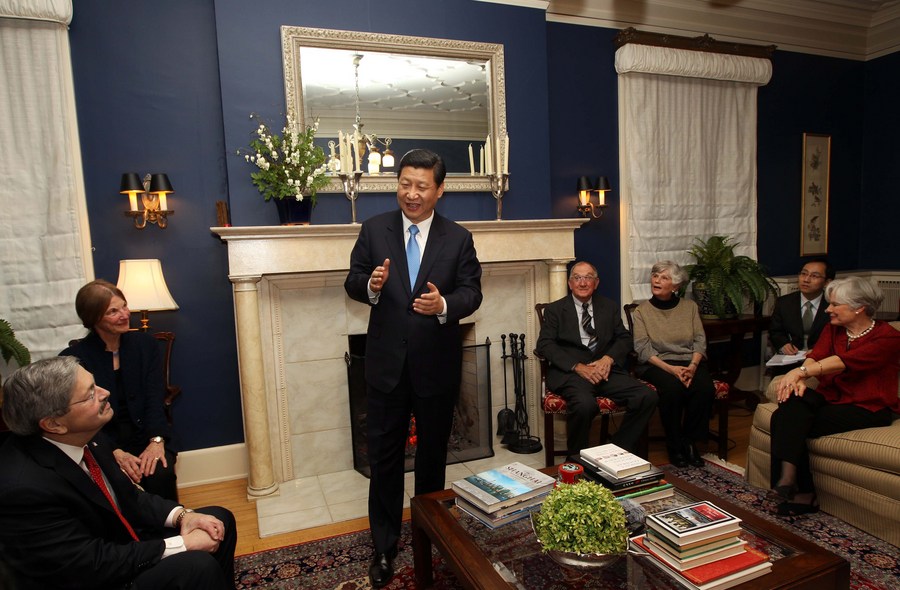

Cascade Elementary School students show their Happy Chinese New Year cards made for Chinese President Xi Jinping, in the town of Orem in the U.S. state of Utah, on Jan. 21, 2020. (Xinhua/Gao Shan)
People-to-people exchanges have always been a foundation of President Xi Jinping's foreign policy, from the Belt and Road Initiative (BRI) to China-U.S. relations, because people-to-people exchanges are the foundation of how independent countries with independent interests can best build common understanding and mutual appreciation.
Recently, President Xi has focused on people-to-people exchanges in order to improve China-U.S. relations, which have spiraled down to the lowest level in decades. President Xi had a personal, friendly meeting with Microsoft co-founder Bill Gates, where he referenced "people" as the foundation of China-U.S. relations. Then Xi's congratulatory letter to the event titled "Bond with Kuliang: 2023 China-U.S. People-to-People Friendship Forum" stated that "Amity between peoples holds the key to the relationship between countries."
These two highly symbolic events resonated with me. When Xi placed China's hope on the American people and wished all the best for the friendship between the two peoples, it triggered memories of five occasions related to Xi and people-to-people exchanges, three of which were when I interacted with him personally.

Chinese President Xi Jinping meets with Bill Gates, co-chair of the Bill & Melinda Gates Foundation, in Beijing, capital of China, June 16, 2023. (Xinhua/Yin Bogu)
The first, in 2006, was when Xi was secretary of the Communist Party of China (CPC) Zhejiang Provincial Committee. Early in the year, Xi and I met privately in Hangzhou, and although the focus was on Zhejiang's development, it was clear how much Xi valued people-to-people exchanges in aiding that development. Later in the same year, I, along with my long-time partner, Adam Zhu, was asked to advise on and help to coordinate public relations for "Zhejiang Week" in New Jersey, Zhejiang's sister U.S. state. Xi of course led the delegation and his speech stressed the importance of the peoples of Zhejiang and New Jersey working together at all levels and in all sectors, from business and the arts to science and healthcare. U.S. media, including Bloomberg, gave quite positive coverage.
The second, in early 2012, when Xi was vice president of China, he conducted a five-day tour of the United States. Stopping in Los Angeles, he held a luncheon for over 100 leaders in entertainment, business and government. Much of his speech stressed the importance of people-to-people connections between Chinese and Americans, which he reinforced by attending a Los Angeles Laker basketball game.
The third, in 2015, in preparation for President Xi's state visit to the United States, I was asked to travel to speak at a ceremony to dedicate the Sino-U.S. Friendship House in Muscatine, Iowa. The house has come to symbolize the desire of common people for closer ties between China and the United States, because in 1985 Xi, then a young local official, stayed in this same house as part of a delegation visiting Iowa to learn agricultural techniques. Xi had included a return visit to Muscatine, meeting with old friends, on his 2012 U.S. visit. We call it the "Muscatine Spirit."

File photo taken on Feb. 15, 2012 shows then Chinese Vice President Xi Jinping (C) speaks as he joins dozens of ordinary Americans for tea at a local house owned by Sarah Lande in Muscatine, a small city in Iowa, the United States. (Xinhua/Lan Hongguang)
The fourth, in the middle years of the last decade, was when I was first following the rapid developments in the Belt and Road Initiative. I noted in the media that although the BRI was about large infrastructure and industrial connectivity, Xi included in BRI objectives people-to-people connectivity. This exemplified, I said at the time, that Xi sees people as foundational, infrastructure as instrumentational.
The fifth, in December 2018, at the 40th anniversary of China's reform and opening-up, was when I was privileged to be among the 10 foreigners to receive the China Reform Friendship Medal. After awarding me the medal, President Xi said that facilitating China's communications with the world is essential, so that foreigners can come to know the real China. The media and people-to-people exchanges are the two vehicles to make this happen, Xi always stressing the latter.
Here are four characteristics of effective people-to-people exchanges: First, they are conducted for their own sake; there can be no ulterior motives. Second, they spring naturally from many small sources. Third, they have diverse kinds of connections, such as common professions, like healthcare, science and culture, or common interests, like business, sports and charities. Fourth, they have diverse timeframes, such as a single one-off event like tourists traveling abroad, or continuing relationships like healthcare professionals working together to prevent future pandemics.
People-to-people exchanges are powerful instruments for international understanding and cooperation. All should support President Xi's vision.
Robert Lawrence Kuhn, a public intellectual and international corporate strategist, won the China Reform Friendship Medal (2018). He is also chairman of the Kuhn Foundation.
The first training camp of the Center of Innovation and Maritime Excellence, supported by Chinese companies, was opened Thursday in Djibouti City, the capital o...